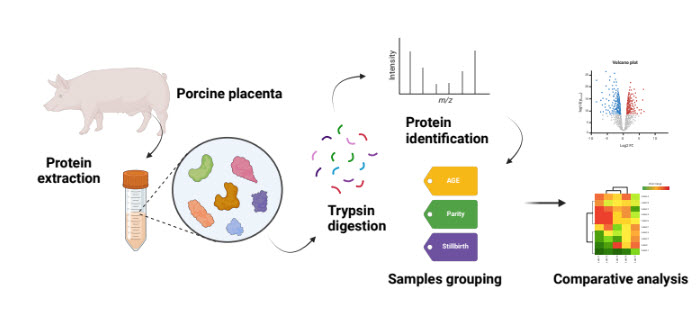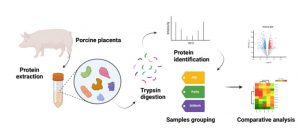Highlight Activities 2025: Proteomic Profiling of Pig Placenta Reveals Key Biomarkers Linked to Sow Reproductive Performance
Reproductive performance is a key factor in swine farming, yet the
molecular mechanisms underlying critical reproductive traits remain
poorly understood. This study utilized mass spectrometry-based
proteomics to analyze protein expression profiles in pig placenta,
categorizing samples by sow age, parity, and stillbirth incidence. A
total of 8261 proteins were identified, with gene ontology analysis
highlighting roles in proteolysis, transcriptional regulation, and
immune response. Comparative analysis revealed 87 differentially
expressed proteins (DEPs) between young and old sows, 115 DEPs between
low and high parity sows, and 103 DEPs linked to stillbirth incidence.
Notable proteins, such as laminin G2, methionine sulfoxide reductase
B3, and FERM domain-containing 7, were significantly correlated with
reproductive traits. Integrative analysis identified YEATS
domain-containing 4 as a consistently downregulated protein across all
traits, while nephrocystin 1 was linked to low birth weight and
stillbirth incidence. Functional enrichment analysis underscored the
role of cytoskeletal proteins and transporters in placental nutrient
exchange and fetal development. This study expands the understanding
of pig placental proteomics and identifies potential biomarkers for
improving sow reproductive performance. Future studies will focus on
validating these findings and translating them into practical
applications for breeding selection and reproductive management in
swine production.
อ้างอิง:
Harnvoravongchai, P., Phanchana, M., Pholmanee, N., Ladda, B., Thita,
T., Ounjai, P., Roytrakul, S. and Janvilisri, T., 2025. Proteomic
Profiling of Pig Placenta Reveals Key Biomarkers Linked to Sow
Reproductive Performance. Journal of Agriculture and Food Research,
p.101858. doi.org/10.1016/j.jafr.2025.10


